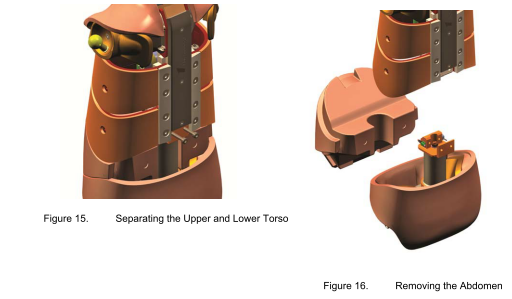Dear colleagues,
I have prepared the codes from the last online meeting in the database so far.
Especially for the Q 10 codes there are some open questions for the coding regarding the current proposal in Peter's table:
a) Coding for the Chest Deflection channels
The Chest is build by a single ribcage element that has vertical side slits. The coding proposal uses TRRI and ABRI Main Location (ML) coding. By reviewing the dummy design (see figure in Peter's last Excel table; see:
http://www.iso-mme.org/forum/viewtopic.php?f=114&t=346) I would suggest that there is an upper and lower chest part (two side slits but still one piece), but the lower part stands not for the abdominal region. There is a separate Abdomen part.

- QA_Abdomen.png (113.67 KiB) Viewed 27979 times
For the side impact usage we will need additional LE/RI information in the coding.
There is also an Angular Measurement on the IRTRACC available (ANZ)
So I would propose for the discussion on the next web meeting the following coding options:
TRRI-Variant
We could use ML TRRI and add UP and LO for the two different measurements.
Frontal
Code: Select all
??TRRIUP00QAVOX? (see X-> 0 comment below!)
??TRRIUP00QADSX? (see X-> 0 comment below!)
??TRRIUP00QAANZ?
??TRRILO00QAVOX? (see X-> 0 comment below!)
??TRRILO00QADSX? (see X-> 0 comment below!)
??TRRILO00QAANZ?
Code: Select all
??TRRILEUPQAVOY? (see Y-> 0 comment below!)
??TRRILEUPQADSY? (see Y-> 0 comment below!)
??TRRILEUPQAANZ?
??TRRILELOQAVOY? (see Y-> 0 comment below!)
??TRRILELOQADSY? (see Y-> 0 comment below!)
??TRRILELOQAANZ?
Similar to the above variant, but the coding will match the ML coding used for the other Q-dummies. Here we always use CHST for the chest deflection measurement.
Frontal
Code: Select all
??CHSTUP00QAVOX? (see X-> 0 comment below!)
??CHSTUP00QADSX? (see X-> 0 comment below!)
??CHSTUP00QAANZ?
??CHSTLO00QAVOX? (see X-> 0 comment below!)
??CHSTLO00QADSX? (see X-> 0 comment below!)
??CHSTLO00QAANZ?
Code: Select all
??CHSTLEUPQAVOY? (see Y-> 0 comment below!)
??CHSTLEUPQADSY? (see Y-> 0 comment below!)
??CHSTLEUPQAANZ?
??CHSTLELOQAVOY? (see Y-> 0 comment below!)
??CHSTLELOQADSY? (see Y-> 0 comment below!)
??CHSTLELOQAANZ?
Finally we should decide on the Direction used with the IR-TRACC measurement.
For the 2D-IRTRACC measurement on the WorldSID there is a "0" direction used for the direct measurement on the IR-TRACC. Actually because the Y direction has been used for the
1D IR-TRACC and the direction of the IR-TRACC must not be exactly in the lateral direction. So this would change the above coding to use "0" for the direction instead of the "X" and "Y".
b) Coding for the optional Acceleration Channel on the Chest
The additional acceleration channels on the Chest are given in the Humanetics Instrumentation list for X and Y direction. So we might remove the Z direction from the coding proposal?

- QA_TRRI_ACX_Y.png (8.17 KiB) Viewed 27979 times
The acceleration sensors will be placed on the Chest. The coding proposal uses TRRI and ABRI Main Location (ML) coding. As said above the lower part of the ribcage is not representing the abdominal part. So we could limit the coding to TRRI.
The coding could look like:
The question marks would allow to fill in more location information based on the chosen location for the (taped) sensors. Actually I suppose that they are taped as for the other Q-dummies.
c) Coding of Femur Load Cell Channels
The load cells are located at the upper Femur. According to the design this will be the only force measurement location on the Femur.
In the current coding proposal the Fine Location 2 (FL2) code is 00.
For other Dummies we use 00 on FL2 for the lower load cell on the Femur (history).
Measurements on the upper Femur always get an UP on FL2.
So I would propose to change the proposed codes also to UP on FL2.
If someone has more/different information or other ideas on the coding please post here or join the next web meeting on the 16th of October 2013.
Bye,
Dirk